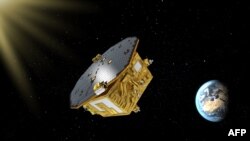The launch of a European satellite that will test a technique to detect ripples in space that can be caused by merging black holes has been delayed because of a technical problem with its Vega rocket, the European Space Agency (ESA) said Tuesday.
The European-built spacecraft, known as LISA Pathfinder, was due to be launched from French Guiana at 0415 GMT on Wednesday (5:15 a.m. Wednesday in Berlin, 11:15 p.m. Tuesday in Washington). Such delays due to technical issues or poor weather are not unusual.
"ESA's LISA Pathfinder spacecraft is in stable and safe conditions and the launcher teams are currently working on this technical issue," ESA said.
The teams were to decide Wednesday whether to reset the launch for Thursday.
LISA Pathfinder is expected to break ground in the search for the ripples, known as gravitational waves, caused by fast-moving, massive celestial objects.
Unlike light, gravitational waves bend the interwoven fabric of space and time, a phenomenon conceptualized by physicist Albert Einstein a century ago.





